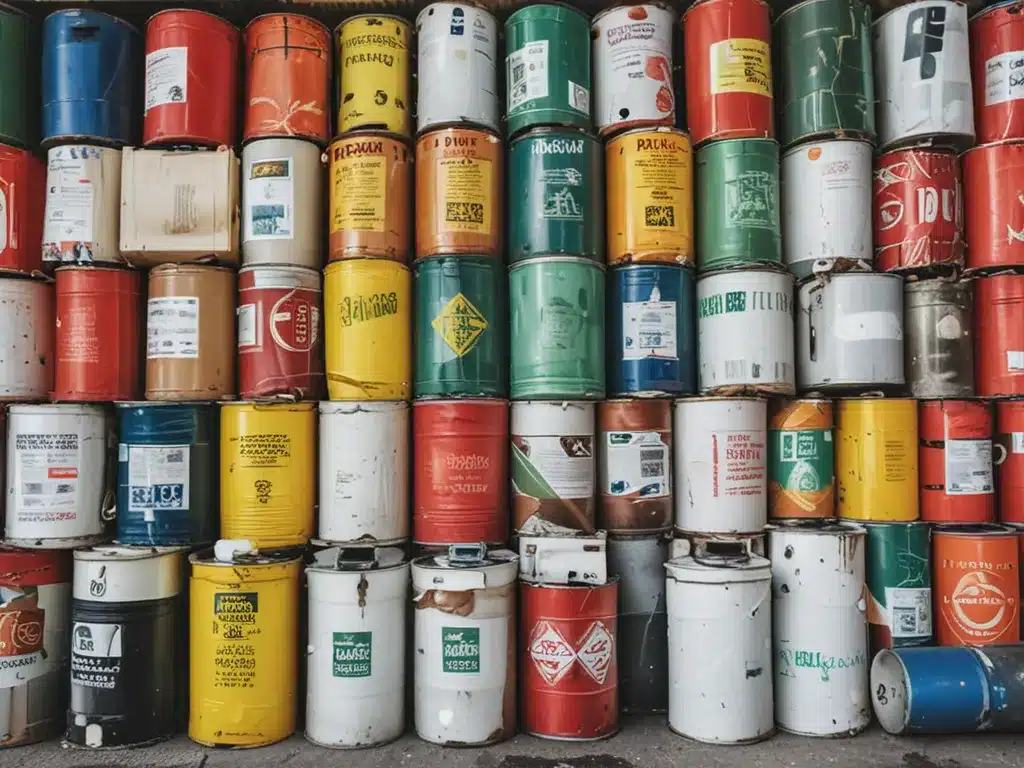Introduction
Household hazardous waste (HHW) refers to leftover household products that contain corrosive, toxic, ignitable, or reactive ingredients. Improper disposal of HHW can pose dangers to human health and the environment. As a responsible household, it is important for me to learn about proper HHW management. In this article, I will discuss various aspects of responsible HHW disposal.
Common Types of Household Hazardous Waste
Some common types of HHW I may have at home include:
-
Cleaning products – Drain cleaners, oven cleaners, floor care products, polishes etc. These often contain corrosive ingredients like lye or sodium hydroxide.
-
Automotive products – Motor oil, fuel additives, carburetor cleaners, batteries etc. These may contain petroleum, heavy metals or corrosive ingredients.
-
Lawn and garden products – Pesticides, herbicides, fungicides, fertilizers. These can contain toxic chemicals.
-
Electronics – computers, monitors, TVs, cell phones. These contain heavy metals like lead, mercury, cadmium.
-
Paints, stains and varnishes – oil-based paints, stains, varnishes, thinners, strippers. These often contain volatile organic compounds.
-
Fluorescent light bulbs – CFLs and fluorescent tubes contain mercury vapor.
Why Proper Disposal is Needed
Improperly disposed HHW can:
-
Contaminate landfills – Toxic ingredients can leach into soil and groundwater.
-
Harm sanitation workers – Corrosive or reactive chemicals can cause injuries.
-
Pollute incinerators – Burning HHW can release toxic fumes into the air.
-
Damage sewage systems – Drain disposal of chemicals can disrupt sewage treatment processes.
-
Harm aquatic life – Toxic chemicals from HHW can reach water bodies and harm marine ecosystems.
Proper disposal as per guidelines is crucial to prevent such outcomes.
Disposal Methods and Locations
Here are some recommended methods and locations for disposing different types of HHW:
Hazardous Waste Collection Events
Many municipalities organize periodic HHW collection events where residents can drop off their waste. These events are free and open to households. I can contact my local sanitation department to find schedules for upcoming events in my area. Items accepted often include:
- Pesticides and fertilizers
- Automotive fluids and batteries
- Paints and solvents
- Cleaning solutions
- Fluorescent bulbs
Permanent Collection Facilities
Some cities have permanent HHW facilities open year-round. I can search online for “HHW disposal near me” to find facilities in my region. These locations accept hazardous waste on designated drop-off days. Common accepted items are:
- Lawn and garden chemicals
- Household cleaners
- Automotive chemicals
- Paint thinners and strippers
- Propane tanks
- Pool chemicals
Retailer Take-Back Programs
Many retailers that sell automotive, DIY, and electronics products also offer take-back programs. For instance:
- Auto stores – Take back used motor oil, batteries, cleaners.
- Hardware stores – Take back paint, pesticides, CFL bulbs.
- Electronics retailers – Take back old computers, phones, TVs.
I should call local stores in advance to ask if they accept HHW returns.
Mail-Back Options
For certain HHW like household batteries, fluorescent bulbs, electronics etc, I can use prepaid mail-back programs. Websites of manufacturers often provide prepaid shipping labels to mail these wastes to recycling centers.
Hazardous Waste Disposal Companies
For large volumes of hazardous waste, I can hire professional disposal companies. They will safely collect and dispose regulated HHW. This option needs upfront fees but is convenient.
Safe Handling and Storage Tips
Until I am ready to properly dispose of HHW, I need to store it safely by following these tips:
-
Original containers – Keep chemicals in their original labeled containers. Do not decant into food jars.
-
Lids tight – Make sure lids and caps are tightly sealed to avoid spills and evaporation.
-
Cool, dry place – Store hazardous products in a cool, dry place away from direct sunlight and moisture. Avoid temperature extremes.
-
Secure storage – Keep hazardous products in locked cabinets or shed so children and pets cannot access them.
-
Separate storage – Do not store chemicals with food to avoid contamination.
-
No mixing – Never mix HHW together as it can cause dangerous chemical reactions.
-
Gloves – Wear protective waterproof gloves when handling hazardous waste.
Conclusion
As a responsible household, I must make efforts to minimize my HHW generation. For any hazardous waste I do produce, I will explore the recommended disposal options like HHW collection events, retailer programs, and licensed disposal companies. With proper handling and disposal, I can prevent my household hazardous waste from harming people or planet.







